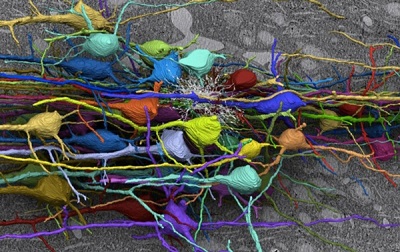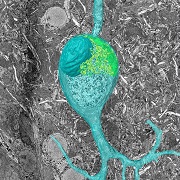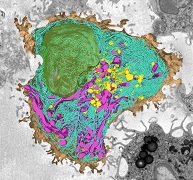Tools and Technologies

Information
Date
July 21, 2015 – July 27, 2015
– Workshop Tue. July 21 – Fri. July 24
– Symposium Sat. July 25 – Mon. July 27
Summary
We are living in a very fortunate time in which we have the tools to unravel the complexity of the brain and reveal its simple underlying structure. Such revelations may lead us to an understanding of the brain in which its activities can be described by the rules of physics alone. These cutting edge technologies include: optogenetics, connectomics, superresolution microscopy, genetics in model systems, and neuroinformatics. We believe that the combined use of these complementary techniques will provide an excellent future direction for brain science research, thus, we will gather scientists with diverse expertise to discuss this concept at our first symposium.


Organizers
Hiromu Tanimoto
(Professor, Graduate School of Life Sciences, Tohoku University)
Ko Matsui
(Associate Professor, Graduate School of Medicine, Tohoku University)
Poster
– Download [PDF]
Workshop Dates
Tue. July 21 – Fri. July 24
Workshop Onsite Registration
Tue. July 21 12:00 – 13:30
1st Floor Lecture Room (Med Sch Bldg #6)
Tohoku Medical Megabank Building
Department of Medicine at Seiryo Campus, Tohoku University
[MAP]
Workshop Banquet
Tue. July 21 18:00 – 20:30
1st Floor Atrium (Med Sch Bldg #6)
Attendance of the banquet is optional. Please register online to attend the banquet.
Faculty members and corporate attendees' participation fee is 3,000 yen.
Students' participation fee is 1,000 yen. Academic speakers are free of charge.
The fee will be collected at the onsite registration on July 21.
Workshop Items
The following workshop stations will be distributed in Med Sch Bldg #6, #5, and #1 in Seiryo Campus, Tohoku University [MAP]
1. JEOL, Remote EM
2–1. Leica, STED microscopy
2–2. Leica, DLS microscopy
3. Nikon Instech, N–SIM microscopy
4. Nikon Instech, Neurolucida software
5. Olympus, SDSRM microscopy
6. ZEISS, Light–sheet microscopy
7. ZEISS, Airyscan microscopy
8. ZEISS, IMARIS software
Workshop Overview
- Pre–registration using the form on our website is required to attend the workshop. Unregistered, walk–in attendance is strictly prohibited.
- Only those who can attend the entire workshop will be allowed to participate.
- Maximum of ~24 participants. The pre–registration list will be evaluated by the organizers, and the results of the selection will be announced later.
- A variety of the latest microscopes (light–sheet, next generation confocal, super–resolution, etc.) will be demonstrated, with technical support provided by the manufacturers.
- The timetable of the workshop will be as follows: one day of lectures, one day of rotations, two days of individual projects. Several of the participants will be expected to give short presentations at the end of the workshop.
- It will be preferable if the workshop attendees bring their own samples for use during the microscopy sessions. Transparentation techniques such as ScaleA2, CUBIC, SeeDB, and CLARITY may be useful, but they require sample processing before the workshop. Those who wish to apply these techniques to their samples should discuss this beforehand with the organizers, who in turn will consult with the specialists at the microscopy companies.
- Please contact Dr. Tatsuya Sato (tatsuyasato1118*gmail.com, substitute * with @) to inquire about the details of the workshop, after pre–registration using our website.
Workshop Lectures
Workshop Day 1 : Tue. July 21
Med Sch Bldg #6 Lecture Room
13:40 – 14:20
Haruo Mizutani(Harvard University, USA)
The suite of connectomic technologies
Workshop Day 4 : Fri. July 24
Med Sch Bldg #6 Lecture Room
15:00 – 15:40
Valentin Nägerl(University of Bordeaux, France)
Imaging neurons and synapses at the nanoscale by STED microscopy
Optogenetics Workshop
Optogenetics workshop will be held in Dr. Ko Matsui's laboratory during the same time as the above microscopy workshop.
Dr. Tomomi Tsunematsu from Univ. Strathclyde (UK) will lead the workshop as an external adviser.
Due to limitation of lab space, only 5 attendees will be permitted.
Using a variety of optogenetic transgenic mice and rats that we maintain in Tohoku University, we will attempt in vivo optical control of brain cells and examine the effects with EEG and behavior.
Symposium Dates
Sat. July 25 – Mon. July 27
Symposium Onsite Registration
Sat. July 25 12:00 – 13:30
TOKYO ELECTRON House of Creativity at Katahira Campus, Tohoku University [MAP]
Symposium Location
TOKYO ELECTRON House of Creativity at Katahira Campus, Tohoku University [MAP]
Lectures @ 3F Lecture Room
Posters @ 1F Lounge
Symposium Banquet
Sat. July 25 18:30 – 20:30
Westin Hotel Sendai
Attendance of the banquet is optional. Please register online to attend the banquet.
Faculty members and corporate attendees' participation fee is 6,000 yen.
Students' participation fee is 1,000 yen.
Academic speakers are free of charge.
The fee will be collected at the onsite registration on July 25.
Symposium Overview
- Pre–registration using the form on our website is required to attend the symposium.
- We are expecting a maximum of ~90 participants.
- 10 – 20 poster presentations can be made. Please register online if you would like to present a poster.
- 17 domestic and international invited speakers each provide a 40 – 60 minute presentation with discussion time.
- The abstracts of the presentations will only be distributed in paper format, and uploading the abstract content to the website is strictly prohibited.
Symposium Speakers List
- Shu Kondo(National Institute of Genetics, Japan)
Frontiers of genome engineering in animal genetics: how CRISPR/Cas9 is changing Drosophila research - Katrin Vogt(Max Planck Institute of Neurobiology, Germany)
Dissecting a visual learning circuit in the Drosophila mushroom body - Koichi Hashimoto(Tohoku University, Japan)
Machine vision and robotics in biology - Masao Tachibana(University of Tokyo, Japan)
Processing of dynamic visual images in the retina - Oliver Griesbeck(Max Planck Institute of Neurobiology, Germany)
Ratiometric in vivo imaging with “Twitch” calcium sensors - Ken Berglund(Emory University, USA)
Luminopsins: Novel optogenetic tools for controlling neuronal activity by bioluminescence - Tomomi Tsunematsu(University of Strathclyde, UK)
Optogenetic perturbation of cell–type specific and depth specific neural activity in vivo - Ko Matsui(Tohoku University, Japan)
Glia optogenetics - C Justin Lee(Korea Institute of Science and Technology, Korea)
Detection of channel–mediated gliotransmitter release - Amit Agarwal(Johns Hopkins University, USA)
Molecular mechanisms of spontaneous Ca2+ oscillations in astrocytes - Jason M. Christie(Max Planck Florida Institute, USA)
Local control of spike signaling within axons of cerebellar interneurons - Ryuichi Shigemoto(IST Austria, Austria)
Quantitative, high–resolution localization of synaptic molecules by freeze–fracture replica labeling and electron tomography - Sabina Hrabetova(SUNY Downstate Medical Center, USA)
Distinct diffusion regimes in brain extracellular space - Jeff Lichtman(Harvard University, USA)
The promises and perils of connectomics -
Gáspár Jékely (Max Planck Institute for Developmental Biology, Germany)
Systems neurobiology of the Platynereis larva Abstract - Michael Häusser (University College London, UK)
All–optical interrogation of neural circuits - Hiromu Tanimoto (Tohoku University, Japan)
Mapping circuits for memory formation
Excursion
An optional excursion is being planned in the afternoon of the last day of the Symposium (July 27). We will come back to Sendai in time for the last flight to Kobe (~19:00). A small fee for lunch and local transportation may be required. For practical reasons, only those who have registered for this excursion will be allowed to attend. Please use the online registration form if you would like to attend the excursion.
Travel grant
We may be able to support your travel expenses to Sendai. Those attending both the workshop and the symposium will be given priority, however,
we may also be able to support researchers who will only attend the symposium. We would like to support mostly graduate students,
postdoctoral fellows, and junior faculty members. Unfortunately, we cannot award travel grants to undergraduate students,
although they are also welcome to attend this event at their own expense. The results will be announced in June.
Please use our online registration form to apply for a travel grant. Please indicate what you foresee you will obtain by attending this event in the text box provided.
We would like to hear about your passion for brain science.
The organizers will largely base their decision on who will receive the travel grants based on the text which you write.
The travel grant is supported by the Comprehensive Brain Science Network (CBSN; 包括型脳科学研究推進支援ネットワーク).
www.hokatsu–nou.nips.ac.jp
Event Registration
– Closed